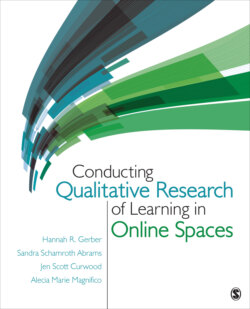Читать книгу Conducting Qualitative Research of Learning in Online Spaces - Hannah R. Gerber - Страница 14
На сайте Литреса книга снята с продажи.
Mediated Spaces and Online Learning
ОглавлениеFor qualitative researchers wanting to understand the everyday, the Internet has therefore become almost unavoidable, but is also often troubling in the extent to which it seems to challenge our starting premises about who we study, where they are, and what they do there. (Hine, 2013, p. 2)
Advances in technology have led to new and shifting landscapes, often presenting researchers with multiple challenges in investigating evolving online spaces and practices. Consequently, researchers may grapple with questions about designing their study to best understand online meaning making (Black, 2008; Gee, 2007; Hine, 2000; Nardi, Ly, & Harris, 2007). This book highlights how scholars have examined learning in digital spaces, and it provides seminal examples and prompts to inform and inspire future research. This book pushes researchers to think through existing approaches and methodologies, and to consider alternative and multiple ways to approach the study of learning in online spaces.
The Internet and online learning are not new. In fact, online social spaces like Usenet and multiuser domains, also known as MUDs, were present in the 1970s. These eventually led to other variations, such as MOOs (a MUD that is object oriented) and MUVEs (multiuser virtual environments) that supported flexible environments and user creativity (Slator et al., 2007). Though research has attempted to define characteristics of online learners (Dabbagh, 2007), examining the features of online spaces will allow researchers to explore more deeply examples of meaning making.
In so doing, this book calls attention to the complicated nature of investigating learning in online spaces. Given that online environments continually and often dramatically change, this book avoids claims about what online learning spaces are. Instead, this book provides understandings of how researchers have collected, generated, and analyzed data, as well as (re)considered the affordances and limitations of their chosen approaches.
